The best ERP systems for process manufacturing
Process manufacturers create their goods by combining ingredients and supplies using a formula or recipe. These manufacturers often produce bulk products like petroleum, pharmaceuticals, food and beverages, chemicals, and plastics.
Tracking, compliance, and scheduling tools are critical to maintaining peak efficiency and ensuring safety and quality, especially in highly regulated industries. With such specific needs, ERP systems for process manufacturers must deliver highly specialized tools.
Because of the variety of process manufacturing businesses, many ERP systems are developed for specific niches, such as food and beverages, pharmaceuticals, or chemicals.
Compare the features of process manufacturing ERPs with our free ERP comparison tool
Best ERP systems for process manufacturing
Sage X3
Sage X3 is a powerful ERP system designed for global process manufacturers. It ensures worldwide compliance, helping businesses navigate complex regulations and currencies across sectors.
Accessible online from any device, Sage X3 boosts product quality and flexibility. This complete solution covers accounting, inventory, supply chain, sales, and customer management. Its comprehensive lot and batch traceability tracks materials from supplier to finished product, vital for safety and compliance in industries like food and pharmaceuticals.
Plex ERP
Plex is another well-established ERP system that serves process manufacturing, particularly in the food and beverage industry, with its end-to-end quality, instant traceability, and industry-leading cost and inventory management.
Plex helps food and beverage manufacturers achieve regulatory compliance and safe production with electronic HACCP programs.
Its real-time traceability enables rapid product recalls, allowing quick tracking of ingredients and products (a benefit seen by customers like Dominion Liquid Technologies). The ERP also supports nonconformance, corrective action, and statistical process controls, features essential for maintaining high production standards.
DELMIAWorks Manufacturing ERP
DELMIAWorks provides comprehensive tools for process manufacturers, including MES functionality. It manages everything from HR and finance to warehouse and quality assurance. Crucially for food and beverage, its "first expiry, first out" (FEFO) logic minimizes waste and stock loss for perishable goods. The system also handles flexible recipes, variable production, and full lot tracking from field to shelf for transparency and quick recalls
DELMIAWorks is designed to enhance productivity and efficiency by connecting different business functions in a single platform, ensuring that all aspects of production are aligned, from quality control to financial reporting.
QAD Adaptive ERP
QAD has long provided ERP solutions to process manufacturers, particularly those in the food and beverage industry. QAD focuses on industries with complex forecasting requirements and strict regulations, such as distilleries, wineries, and frozen food producers.
A global frozen food manufacturer implemented QAD's solutions to drive lean transformation, achieving a 17% improvement in forecast accuracy and reductions in excess, obsolete, and written-off inventory, totaling nearly $500K.
Aptean Food & Beverage ERP (JustFood Enterprise Edition)
Aptean Food & Beverage ERP, also known as JustFood, is another ERP that serves process manufacturers, including food and beverage companies. Whether you co-pack, private label, or produce your own line of food or specialty items, you have unique requirements in product development, production, inventory, costing, lot traceability, compliance, planning, scheduling, and warehousing.
To dynamically adjust recipes for nutritional, physical, and cost targets, you need process manufacturing ERP software. Perhaps you need to adjust specs based on inventory or reserve products for a specific customer. Need role-based dashboards with drill-down capabilities? You need a process manufacturing ERP.
Maintaining quality amidst changing consumer demands
Demand has shifted towards purchasing foods free from preservatives and GMOs. Organic food demands require ERP systems to ensure all ingredients and processes are organic. Businesses rely on ERP systems to adjust recipes amidst changing demands while maintaining product quality and nutritional benefits.
Ingredient transparency and labeling requirements
Consumers today want to know what goes into their food, and ingredient labeling is becoming an important factor in product packaging. Those ingredients are unique to each batch and recipe, and ERP systems supply the list for the needed label.
Food and beverage manufacturers, along with many process manufacturers, are very stringently governed by regulations. Organizations such as the FDA, EPA, OSHA, and FTC are rather diligent in enforcing norms related to the launch of healthy products, regulating food labels, and maintaining a clean and hygienic environment.
ERP systems for process industries must provide business intelligence and reporting tools that make such compliance as simple and routine as possible, ensuring no reporting errors.
The importance of inventory management in food safety
Inventory management is critical in the food industry and in other process-related businesses. Food is susceptible to pathogens if not stored properly. It's not just about quantity and money, but the quality of stores as well.
Process manufacturers must document and use current good manufacturing practices (cGMP). These should be integrated, not added on, to ERP systems for process businesses. Maintain a culture that prevents, rather than reacts to, issues. Electronic document management is an excellent way to meet cGMP using ERP.
Pharmaceutical manufacturing and regulatory challenges
Food and beverage companies are just one part of the process manufacturing landscape. Pharmaceutical manufacturers face unique challenges, including long product development cycles and the constant pressure of changing market demands. On top of that, regulatory agencies play a significant role in shaping production processes in this industry.
Managing formulas in pharma is as crucial as handling recipes in food and beverage. Both industries face non-conformance challenges. Pharma often requires flexible product specs to meet varying customer or country needs, with products sold in multiple strengths and tailored billing to match.
Plastics manufacturing ERP
Plastics manufacturers deal with unique production processes, including managing by-products and co-products, and typically produce goods on a made-to-order basis. ERP systems tailored for plastics must handle these nuances by offering advanced production planning, quality management, and waste reduction tools.
- Inventory management: Plastics manufacturers often face volatile demand and short product life cycles. An ERP system helps optimize inventory management by forecasting demand, reducing overproduction, and minimizing the stock of expensive raw materials like resins.
- Regulatory compliance: Plastics manufacturing involves the use of hazardous materials that require strict adherence to environmental regulations. ERP systems provide the necessary tracking and reporting tools to comply with these standards.
- Real-time production data: An ERP system enables manufacturers to collect and analyze real-time production data, improving operational efficiency. This is critical in managing production lines that need to adapt quickly to order-specific requirements.
Chemical manufacturing ERP
Chemical manufacturers operate in one of the most regulated industries, dealing with hazardous materials, strict safety protocols, and extensive documentation requirements.
In fact, 86% of US-based chemical manufacturers report an increased regulatory burden and expect more new regulations across all government levels next year. ERP systems in this sector must focus on compliance management, formula optimization, and traceability.
- Compliance and safety: Chemical manufacturers must comply with various international regulations, including those from OSHA, EPA, and REACH. ERP systems like Sage X3 offer robust compliance management tools, enabling real-time tracking of hazardous substances and simplifying regulatory reporting.
- Batch control: In chemical manufacturing, batch control is essential. ERP systems allow for precise formula management, including adjusting batch sizes dynamically and tracking every raw material throughout the production process.
- Waste reduction: Chemical manufacturing often produces by-products that need careful disposal. ERP systems help manage waste by ensuring proper documentation and scheduling of disposal procedures, reducing environmental impact and compliance risks.
Oil & Gas ERP
Oil & Gas companies operate globally and face constant volatility in market conditions, as well as complex logistical and regulatory challenges. ERP systems must provide tools for asset management, regulatory compliance, and real-time data analytics to help businesses remain competitive and agile.
- Asset management: Oil & gas companies manage large, expensive assets like pipelines, refineries, and drilling rigs. ERP systems such as QAD or Sage X3 provide real-time asset tracking and maintenance management tools, ensuring that equipment is operational and minimizing costly downtimes.
- Supply Chain Optimization: The industry operates on a global scale, with supply chains spanning multiple regions. Oil and gas ERP systems help optimize these supply chains by coordinating production schedules with transportation logistics, refining operations, and market demand.
- Compliance: The oil and gas industry faces some of the strictest regulations concerning environmental protection and operational safety. ERP systems can track environmental metrics, manage compliance documentation, and help with real-time reporting to ensure companies
Selecting a process manufacturing ERP
When selecting the best-fit ERP system for your process manufacturing business, it’s crucial to evaluate your specific needs. Start by creating a comprehensive list of your requirements, considering factors such as:
- Industry regulations: Does your ERP need to handle FDA, EPA, or HACCP compliance?
- Traceability and quality control: Do you need end-to-end traceability for recalls or quality assurance?
- Customization and integration: Can the ERP adjust to your production scale or recipe management needs?
- Real-time data: Does the system offer cloud access for real-time monitoring and decision-making?
Conclusion
The best process manufacturing software is the one that meets the unique needs of your business. Devote the time and resources necessary to build your list of requirements, and there will be at least one ERP provider to help.
Free white paper
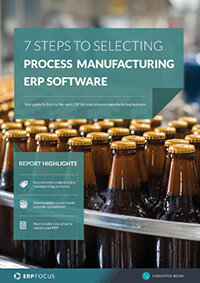
7 Steps to Selecting Process Manufacturing ERP
Your guide to finding the right ERP software for your process manufacturing business
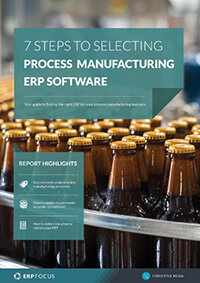
Featured white papers
-
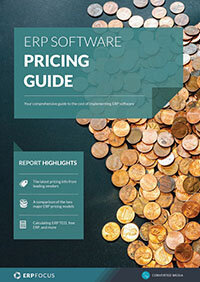
ERP Software Pricing Guide
Get the latest pricing information on over 80 popular ERP systems, and learn how to budget for your ERP project in our free guide
Download -
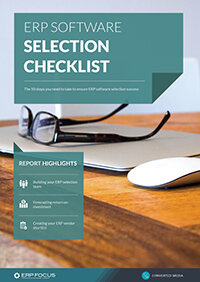
60-Step ERP Selection Checklist
Get the comprehensive checklist for your ERP selection project
Download -
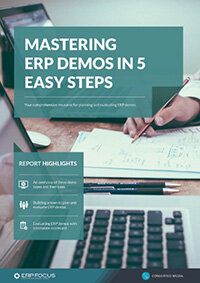
ERP Demo Guide & Scorecard
Master your ERP demo with 5 easy steps using our free guide (includes demo scorecard)
Download
Related articles
-

5 ERP pricing definitions you need to understand
Have you mastered the ERP pricing lexicon yet? Getting to grips with these five definitions is a ...
-

CMMC Compliance: What Aerospace and Defense Manufacturers Need to Know
Key insights on CMMC compliance, deadlines, and securing DoD contracts with CMMC 2.0 certificatio...
-

Top 10 ERP selection criteria (including checklist)
The most important ERP selection criteria you should keep in mind during your selection process.

